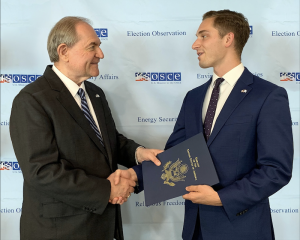
Max Loebl Reflects on an OSCE Permanent Council Session
By Max Loebl, MALD 2020 Candidate, The Fletcher School
Chattering voices fill the corridor of the Hofburg every Thursday as delegations from OSCE’s 57-member states converge for their Permanent Council. They file in filling a massive corridor and delegates take their respective seats. Witnessing representatives hailing from Vladivostok to Vancouver and in between is an inspiring sight. Though the ultimate goals are security and cooperation, conversations in this space often induce some friction. The common points of disagreement usually relate to the conflict between Russia and Ukraine, the Nagorno-Karabakh conflict between Armenia and Azerbaijan, or Russian encroachment in Georgia. However, a novel debate is sparked today. A back and forth between Ukraine and Russia unfurls over Ukraine’s newly adopted language laws.
Debates over language between Russia and Ukraine reinforce my desire to study the Russian language. Language is inextricably linked with culture. Thus, refining my Russian skills should offer a more nuanced, granular view of the Russian-speaking world. Ukraine’s decision to switch to the Ukrainian language illustrates the significance of language in the context of the Russian-Ukrainian split. It demonstrates how Russian encroachment led Ukraine to further solidify their Ukrainian identity through language. The dialogue between the two delegations is fascinating to listen to as they effortlessly switch between English, Ukrainian, and Russian to make their points. After a month of refreshing and reviewing my Russian, I even find success understanding the conversation without a translator. The discourse may seem turbulent, but it is a demonstrative improvement from the fistfights that broke out in Ukraine’s parliament when the law was first adopted in 2012.
The Organization for Security and Cooperation in Europe (OSCE) is more than just a forum for dialogue. The OSCE exists to promote peace and prosperity across the European continent, embolden economic development and freedom, and protect human rights. Having the opportunity to simultaneously sharpen my Russian while interning with the U.S. Mission to the OSCE provided a phenomenal new perspective to my work. Not only did I gain additional insight and appreciation for divides over language, I slowly but surely gained learn a deeper understanding of Russian culture through language.
Despite the unique challenges like unanimous consent that the OSCE provides, it is undeniably an amazing organization for connecting across cultures and borders for the common good of all member states. Moreover, the U.S. just added a new addition with the arrival of Ambassador Jim Gilmore, the former Governor of Virginia. Ambassador Gilmore’s agenda to promote human rights, democratization, and collective security sparked newfound energy at the weekly Permanent Council meetings. A space for both dialogue and development, I enjoyed my time with USOSCE in Vienna tremendously.
